
Special #ShapiraBookClub edition:
James Tabor with an interesting but ultimately discouraging post on Shapira's Deuteronomy strips
jamestabor.com/moses-shapira-…
h/t @ReligionProf
James Tabor with an interesting but ultimately discouraging post on Shapira's Deuteronomy strips
jamestabor.com/moses-shapira-…
h/t @ReligionProf
What's discouraging is that scholars continue to publicly pronounce that they think blatant forgeries might be genuine & that we need to keep having pointless debates about them for decades.
Here, not just Tabor but archaeologist Shimon Gibson.
Here, not just Tabor but archaeologist Shimon Gibson.
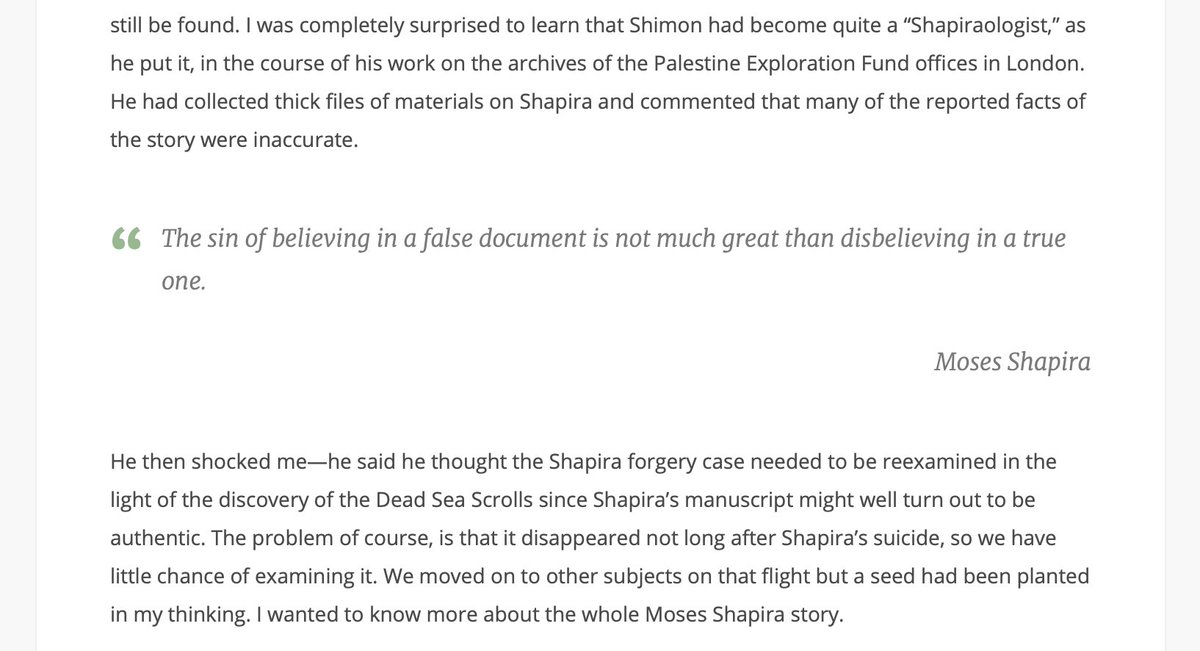
Look who else think Shapira's Deuteronomy was authentic @arsteinjustnes 

This is simply untrue.
There were many other reasons why those scholars dismissed them as obvious forgeries, some quite legitimate -- and we've only added to them in the years since!
These arguments that they might be authentic just ignore the majority of the evidence.
There were many other reasons why those scholars dismissed them as obvious forgeries, some quite legitimate -- and we've only added to them in the years since!
These arguments that they might be authentic just ignore the majority of the evidence.

Final question:
Do we, in 2021, really need a critical edition of blatant forgeries that went missing in the 19th century?
Do we, in 2021, really need a critical edition of blatant forgeries that went missing in the 19th century?
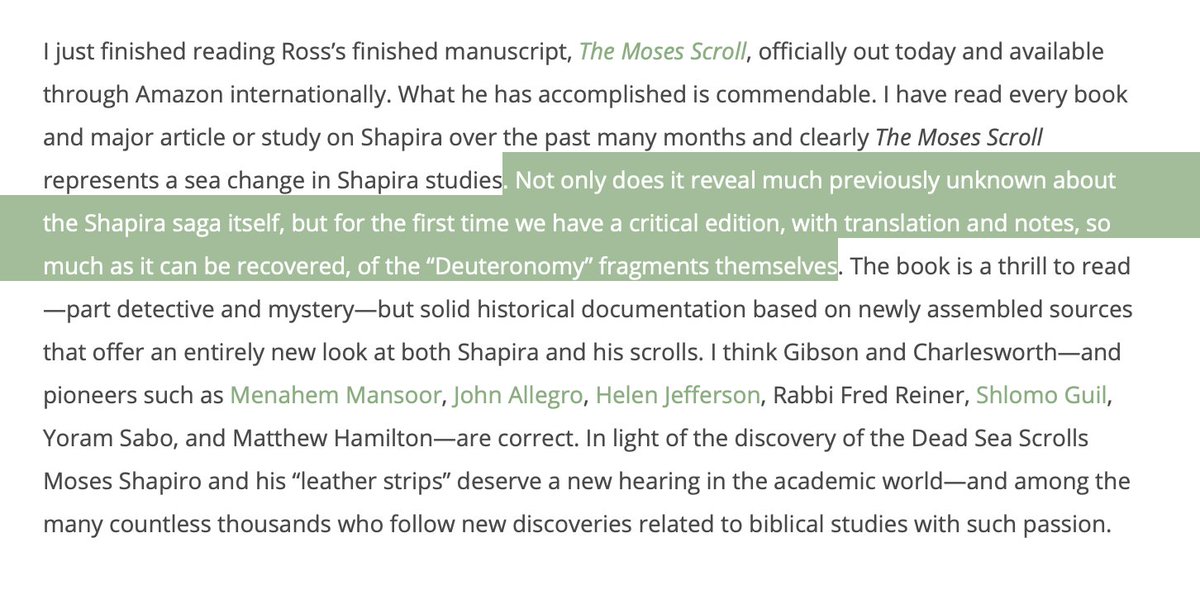
Apparently it was *not* the final question for today.
#ShapiraBookClub just went into overtime:
nytimes.com/2021/03/10/art…
h/t @ymiller419
#ShapiraBookClub just went into overtime:
nytimes.com/2021/03/10/art…
h/t @ymiller419
As you can see just from this thread, the scholar here (Idan Dershowitz) is far from the first to suggest this -- and presumably will be far from the last -- but the NYT can make it more dramatic by pretending otherwise. 

I've seen this stated elsewhere but as far as I can tell it's just not true, but is based the claims of the Guardian's London correspondent in 1883 (& possibly another journalist of the time).
Ganneau wasn't even the first scholar to publicly declare them a forgery!
Ganneau wasn't even the first scholar to publicly declare them a forgery!

What I *can* say is that I'm not sure that this is true. Shapira did sell genuine medieval or early modern manuscripts, but I haven't seen proof he sold a single genuine ancient object -- literally thousands of fakes, though. 

Ganneau didn't publicly declare them as fake until 1874 -- in 1873 he had his suspicions but hadn't seen them in person yet
This matters because Chanan Tigay's Lost Book of Moses confuses the timeline & suggests he did it in 1873, to make Ganneau look like he rushed to judgment
This matters because Chanan Tigay's Lost Book of Moses confuses the timeline & suggests he did it in 1873, to make Ganneau look like he rushed to judgment

Shapira established himself as a respectable seller of medieval and early modern Hebrew manuscripts at the exact same time he was selling fake Moabite pottery.
The Moabite pottery had no effect on his reputation, because (almost?) no one thought he knowingly sold fakes.
The Moabite pottery had no effect on his reputation, because (almost?) no one thought he knowingly sold fakes.

Here's the Punch cartoon (September 8, 1883)
Yes it's bad, and very public, but for once I would love to see a discussion of what people of the time thought of Shapira's Jewishness that relied on *any* evidence beyond a single cartoon.

Yes it's bad, and very public, but for once I would love to see a discussion of what people of the time thought of Shapira's Jewishness that relied on *any* evidence beyond a single cartoon.
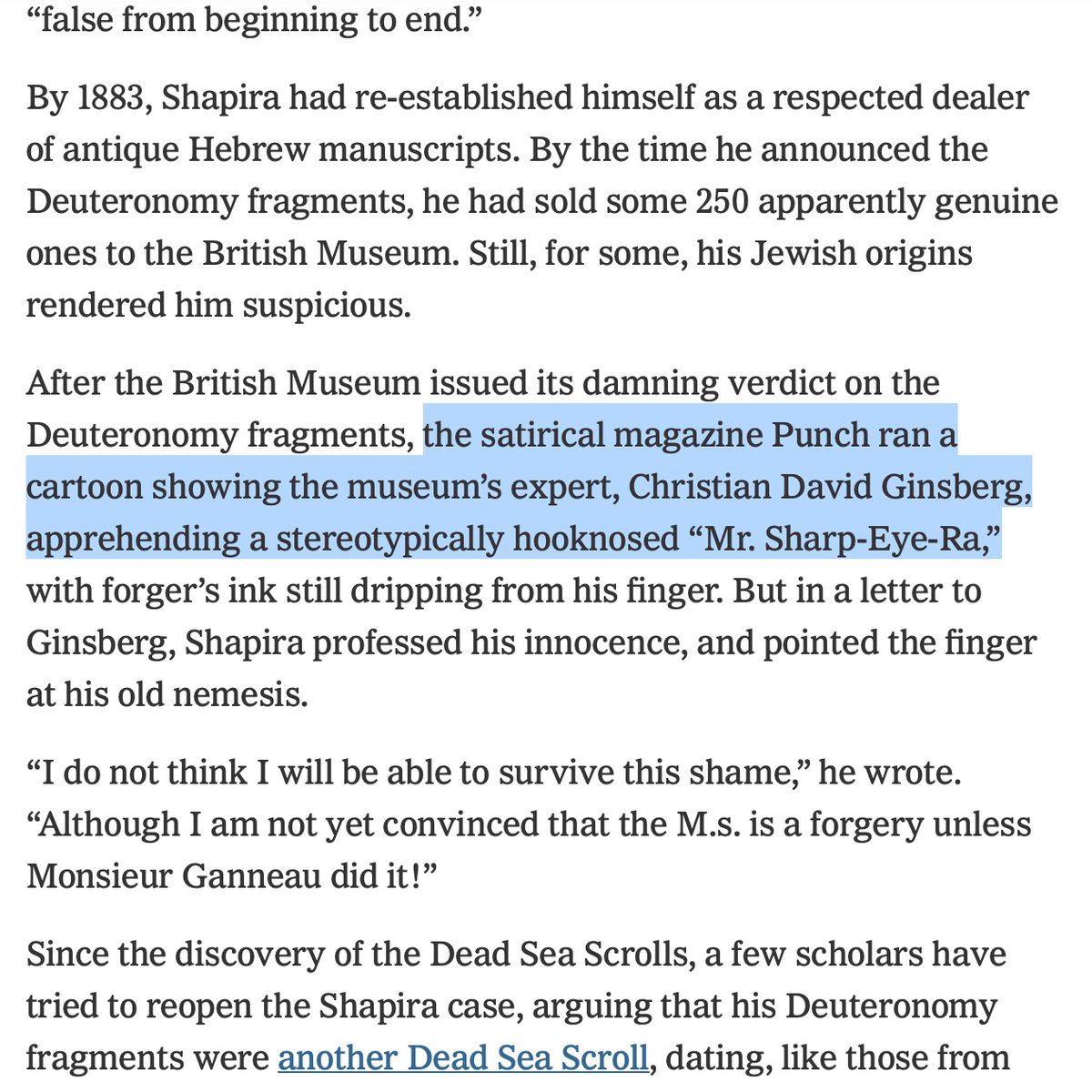

I've seen a little bit of additional evidence of people mistrusting Shapira because he was a Jew (who had converted to Christianity), but it's not a lot, and it needs much greater nuance.
It turns out all this attention to Shapira is having another effect beyond just driving up prices for supposed Shapira forgeries. 

Which Moses?
(On the right is the listing from a catalogue of the bookseller Bernard Quaritch in 1887)

(On the right is the listing from a catalogue of the bookseller Bernard Quaritch in 1887)


In fact, Tigay found several codices (including some he said were made of leather) that had the bottom margins cut off of pages as well. 

This is an interesting suggestion, but Dershowitz has no proof of how damaged the bottom margins were -- and in his journal article his photo suggests that damage on the bottom wasn't regular.
But in the article, with no further evidence, he presents it as the likely reason.
But in the article, with no further evidence, he presents it as the likely reason.
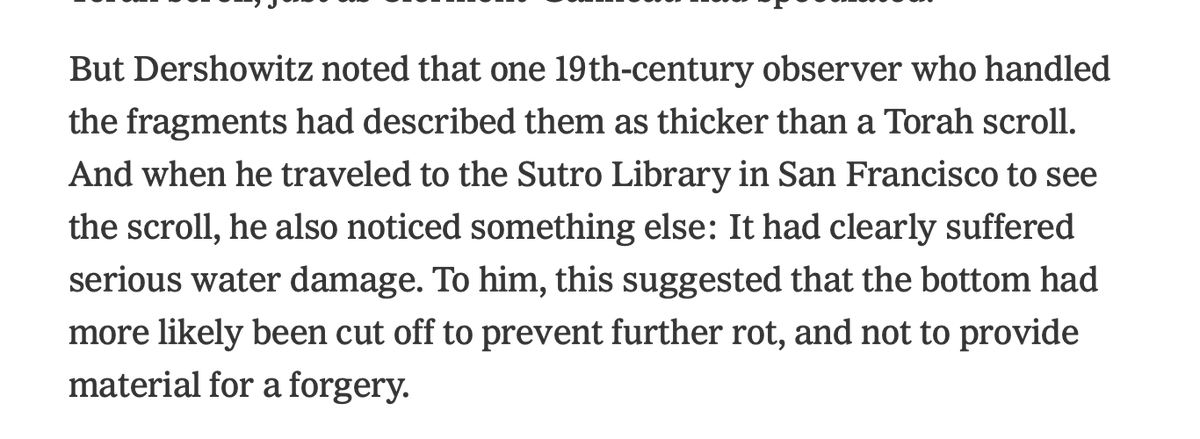
I have to say this is super interesting, & maybe the most important piece of evidence to come along since 1883
I will need to reflect on it further, but, taking a quick look at Dershowitz's book(!), there are obvious alternate possibilities that Dershowitz doesn't even consider
I will need to reflect on it further, but, taking a quick look at Dershowitz's book(!), there are obvious alternate possibilities that Dershowitz doesn't even consider

This is a good question -- I'll say that I think the evidence is actually stronger than Dershowitz suggests, but I'm not an epigrapher so I'm not really qualified for a detailed discussion. 

Christopher Rollston weighs in with a blog post that is somewhat rushed (as he alludes to here) -- for instance he misspells the names of both Dershowitz and Menahem Mansoor throughout -- but is still worth consideration.
rollstonepigraphy.com/?p=896
rollstonepigraphy.com/?p=896

To me, this point on method is a key one, & one I've long believed:
The manuscript disappeared long ago, the scholarly consensus was a forgery; to overturn this we'd need overwhelming new evidence and we simply don't have it.
The manuscript disappeared long ago, the scholarly consensus was a forgery; to overturn this we'd need overwhelming new evidence and we simply don't have it.

To be fair, Dershowitz has discovered at least 1 extremely interesting piece of evidence -- but it's far from the overwhelming evidence we need, especially when there are alternative interpretations of it that Dershowitz doesn't seem to discuss.
https://twitter.com/MichaelDPress/status/1369680100908761092
This is also an important point I think: my sense was that Dershowitz dismisses the evidence we have on script too quickly, but as I mentioned above I'm not an epigrapher! I hope Rollston expands on this at some point. 

But I want to push back against this common claim.
The people who were fooled by the Moabite forgeries were Claude Conder (an army officer w/o scholarly training), Charles Tyrwhitt-Drake (a naturalist), non-scholarly clergy, etc. Very few Semiticists or philologists were fooled!
The people who were fooled by the Moabite forgeries were Claude Conder (an army officer w/o scholarly training), Charles Tyrwhitt-Drake (a naturalist), non-scholarly clergy, etc. Very few Semiticists or philologists were fooled!

I need to learn more about Schlottmann's career but I think Rollston exaggerates here.
Schottmann appears to have believed that all sorts of obvious forgeries were fakes -- including a clearly fake inscription that he used to argue ancient Phoenician presence in the Americas!
Schottmann appears to have believed that all sorts of obvious forgeries were fakes -- including a clearly fake inscription that he used to argue ancient Phoenician presence in the Americas!

The more I learn, the more it seems like Schlottmann was the Cyrus Gordon of his time -- and Rollston conveniently brings up Gordon in the post!
There should be more to come on Schlottmann in #ShapiraBookClub
There should be more to come on Schlottmann in #ShapiraBookClub
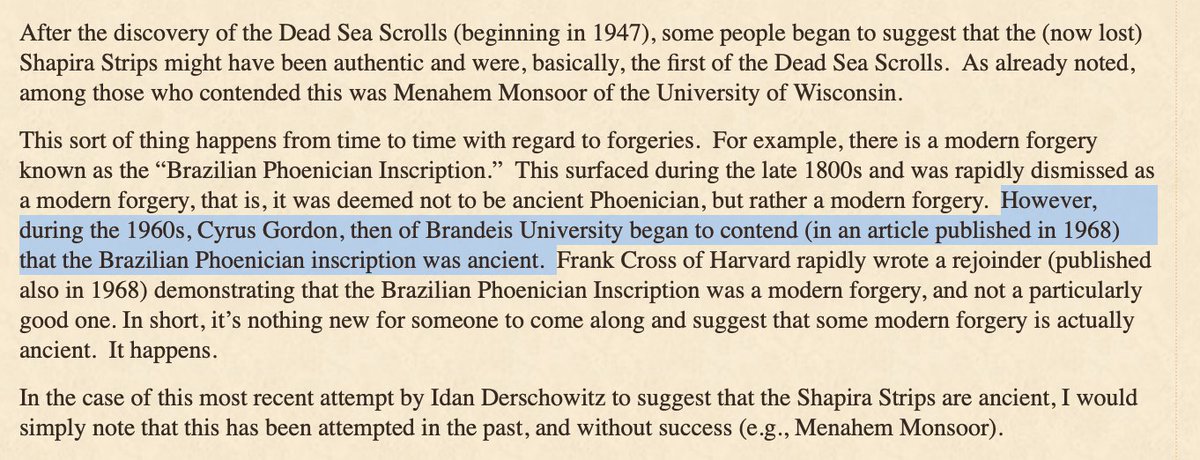
Further developments: see the comments to Rollston's blog post, including a statement of support from Israel Finkelstein and Benjamin Sass with response from Rollston
h/t @arsteinjustnes
rollstonepigraphy.com/?p=896#comments
h/t @arsteinjustnes
rollstonepigraphy.com/?p=896#comments

See also Bill Schniedwind's Facebook post on the article with comments from several scholars
h/t @SethLSanders
facebook.com/schniedewind/p…
h/t @SethLSanders
facebook.com/schniedewind/p…
One question that keeps coming up: Why would Shapira have made a copy of a manuscript that he had faked?
Let Shapira himself explain
(London Times, August 8, 1883; from a statement of Shapira to the British Museum, describing events of 1878)
Let Shapira himself explain
(London Times, August 8, 1883; from a statement of Shapira to the British Museum, describing events of 1878)
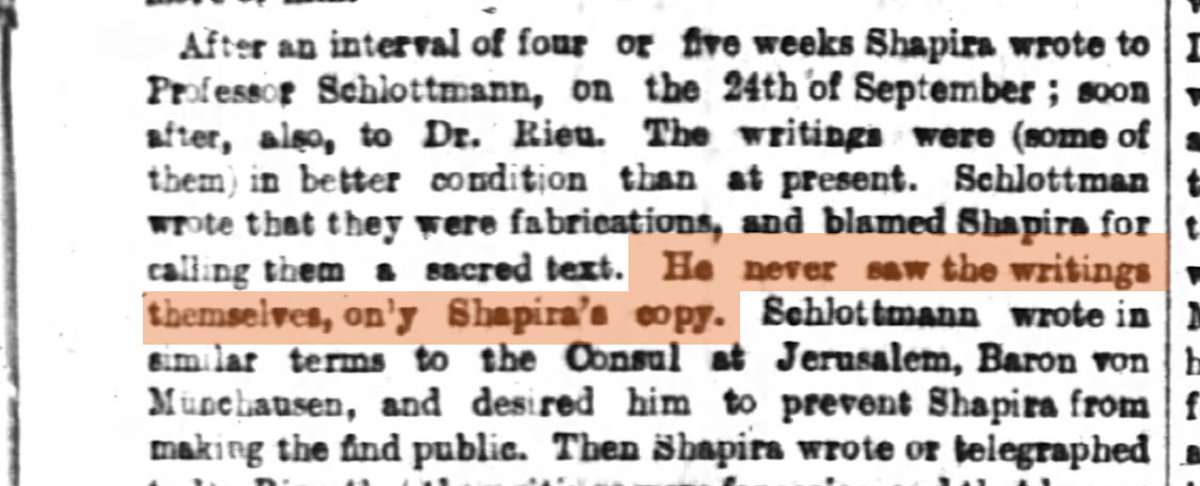
Again, it's kind of pointless to keep arguing about this stuff when the manuscript in question is long missing, but none of the evidence really proves Shapira to be innocent. There are too many possibilities that we simply don't have the evidence to evaluate properly.
• • •
Missing some Tweet in this thread? You can try to
force a refresh



















